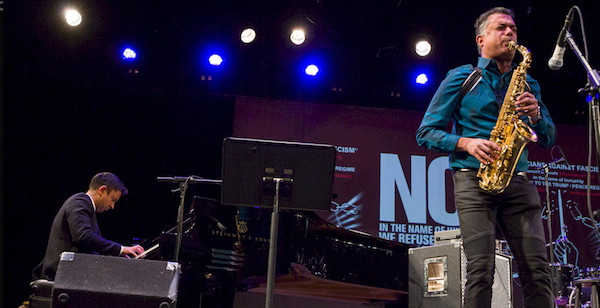Jan 13, 2026 2:09 PM
More Trump-Kennedy Center Cancellations
The fallout from the renaming of the John F. Kennedy Center for the Performing Arts to include President Donald…

Vijay Iyer (left) and Rudresh Mahanthappa perform at the Musicians Against Fascism concert at Symphony Space in New York City on Jan. 19.
(Photo: Scott Friedlander)New York jazz musicians united in concert at Symphony Space on Jan. 19, the eve of Donald Trump’s inauguration to protest—via song and improvisation—potential cultural encroachments by the president’s new regime.
Joining an international brigade to “Organize, fight, resist!” as Musicians Against Fascism, father and son team Arturo and Adam O’Farrill assembled 40 likeminded colleagues in a carefully curated, well-paced three-hour show of strength, exhibiting playful pushbacks, searing flashes of pain and warm camaraderie.
Among the most prominent acts were a handful of piano duets with trumpet, bass and alto sax; several compelling female vocalists saluting pioneers; invocations of forebears; and a collection of well-knit ensembles. Veteran journalist Larry Blumenfeld emceed with acerbic wit, recalling historic precedents with a cautionary compassion.
Arturo, the elder of the two O’Farrill’s on hand, opened the concert with an eloquent introduction, which concluded with these foreboding yet uplifting words: “Our enemy is our indifference to the suffering on this planet. Our enemy is our inaction and our divisiveness. Our enemy is the distraction of the smartphone, the tablet, the computer and our aversion to look one another in the eyes and converse about the true nature of suffering perpetrated by the powerful and the greedy. That’s why we gather on this stage.”
The Westerlies brass quartet then set a jaunty tone and resurrected ghosts of our noble past with an English ballad and Charles Ives’ “Songs My Mother Taught Me.” The O’Farrill’s raced through a wild duo, then Arturo paced a quintet with trumpeter Peter Evans and Lakecia Benjamin on alto sax, Johnathan Blake on drums and Stephan Crump on bass.
The evening was studded with outraged invocations by women with long memories. Early on vocalist Claudia Acuña sang a tender, hopeful original with pianist Pablo Vergara, then segued into an impassioned “Liberdad,” the hymn of Spain’s Civil War (“The People United Cannot Be Defeated”), rekindled by Charlie Haden’s Liberation Music Orchestra.
Women’s marches, which were to take place worldwide Jan. 21 in response to Trump’s ascension to power, were foreshadowed in powerful song. Amirtha Kidambi wailed on “Four Women” (by Nina Simone) squeezing her Indian harmonium. Jen Shyu sang words to the rolling thunder of John Coltrane’s “Alabama,” memorializing schoolgirls in a church bombing (pianist Fabian Almazan and bassist Daryl Johns filled out this combo) before her poignant solo with Taiwanese moon lute on “Song For Naiko” (dedicated to a victim of rape).
The elegant Somi followed with Billie Holiday’s “Strange Fruit” with her hard-hitting ode to a “woman on the road with mouths to feed” whose “two-dollar day” means she “can’t get home again” with assists from Liberty Ellman’s guitar and Toru Dodo’s piano.
There were moments of brightness, hope and forthright humor. Tom, Abigail and Lily Chapin—just arrived from a musical protest uptown with Cher and Natalie Merchant—summoned the merry shade of Woody Guthrie and engaged 350 citizens to sing-along to the lyrics “We Will Not Stop.”
Chaotic electro-babble on trumpet and laptop/bamboo sticks by Evans and percussionist Levy Lorenzo evoked, for this tickled listener, a Trumpian Tweetnado or Barry Blitt cartoon.
A visitation by Roy Nathanson’s Jazz Passengers resurrected emblematic exercises in group creativity: first on the evolutionary true-blue “Tikkun,” for the leader’s alto, Curtis Fowlkes’ trombone, Sam Bardfeld’s fiddle and Bill Ware’s piano, and then via a spin on Rahsaan Roland Kirk’s “Inflated Tear,” complete with Nathanson’s two-sax voicing and poignant lyrics.
After Crump bowed a folksy bass solo for Obama, he was joined by guitarist Mary Halvorson, who led her lanky, rocking “Storm Cloud” with Adam and drummer Tomas Fujiwara, as Amirtha nailed the edgy lyrics: “punctured—by—a—pin!”
Giants Matthew Shipp (piano) and William Parker (bass) rambled assertively in seven-league boots, pursuing a restless quest to redefine musical and political resistance.
Pianist Vijay Iyer and alto saxophonist Rudresh Mahanthappa recapitulated jazz duos through history—Clarence Williams and Sidney Bechet, McCoy Tyner and John Coltrane, Rainer Bruninghaus and Jan Garbarek—and brought their distinctive ethos to the cause of justice.
As an upshot and follow-through, Andy Z of New York City’s Revolution Books spoke up for RefuseFascism.org, passing both the hat and the torch. DB

Belá Fleck during an interview with Fredrika Whitfield on CNN.
Jan 13, 2026 2:09 PM
The fallout from the renaming of the John F. Kennedy Center for the Performing Arts to include President Donald…

Peplowski first came to prominence in legacy swing bands, including the final iteration of the Benny Goodman Orchestra, before beginning a solo career in the late 1980s.
Feb 3, 2026 12:10 AM
Ken Peplowski, a clarinetist and tenor saxophonist who straddled the worlds of traditional and modern jazz, died Feb. 2…

The success of Oregon’s first album, 1971’s Music Of Another Present Era, allowed Towner to establish a solo career.
Jan 19, 2026 5:02 PM
Ralph Towner, a guitarist and composer who blended multiple genres, including jazz — and throughout them all remained…

Rico’s Anti-Microbial Instrument Swab
Jan 19, 2026 2:48 PM
With this year’s NAMM Show right around the corner, we can look forward to plenty of new and innovative instruments…

Richie Beirach was particularly renowned for his approach to chromatic harmony, which he used to improvise reharmonizations of originals and standards.
Jan 27, 2026 11:19 AM
Richie Beirach, a pianist and composer who channeled a knowledge of modern classical music into his jazz practice,…